|
|
|
Sort Order |
|
|
|
Items / Page
|
|
|
|
|
|
|
| Srl | Item |
| 1 |
ID:
145525
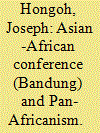

|
|
|
|
|
| Summary/Abstract |
The 1955 Asian-African Conference (Bandung) has been hailed as a turning point in the emergence of the Global South solidarity movement and a pivotal moment in southerners’ collective quest both to liberate themselves from colonialism and to reforge the international order on more inclusive and emancipatory foundations. In this article, the author demonstrates how, in Africa, these aspirations were undermined by nationalist ambitions that privileged self-contained sovereign statehood over potentially more progressive continental solidarity under the Pan-African spirit. The author does so by analysing how the absorption of the Bandung spirit within the Pan-African movement reinforced opportunities for the pursuit of national interests, the affirmation of colonial geographies and economies, and the intensification of forms of solidarities built on the imagined fruits of independence at the expense of a shared history of colonialism. For many African countries, the enduring lessons of the Bandung spirit reside in the challenges of resolving the tensions over the appropriate context for pursuing self-determination and transforming the international order. Thus, while the Bandung spirit delivered the means for newly independent states to engage in international politics through interstate solidarities, it also helped to accelerate the foreclosure of alternative possibilities for intervening in and reshaping the prevailing international order.
|
|
|
|
|
|
|
|
|
|
|
|
|
|
|
|
| 2 |
ID:
155140
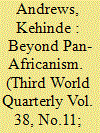

|
|
|
|
|
| Summary/Abstract |
Pan-Africanism is an identifiable movement with its own history and historical and ideological roots. It formally began at the first Pan-African Congress in London in 1900 and has a distinct linage up to the present day African Union. Unfortunately, the movement has not presented a challenge to imperial domination in Africa, rather it has helped continue the exploitation of the continent. Accepting the colonial nation state has prevented any politics of liberation from developing in the movement. It is central to decentre Pan-Africanism from radical histories of resistance because the movement developed in parallel to and rejection of more revolutionary, anti-imperial politics. Garveyism developed a mass movement rooted on the global Black nation, shattering the boundaries of Westphalian sovereignty. Malcolm X picked up the work of Garvey, developing on some of its regressive weakness to form the Organization of Afro-American Unity. By unpicking this tradition from Pan-Africanism we can begin to chart a route to revolutionary concepts and practice of nationalism that can present a challenge to the imperial social order.
|
|
|
|
|
|
|
|
|
|
|
|
|
|
|
|
| 3 |
ID:
171214
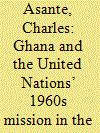

|
|
|
|
|
| Summary/Abstract |
This paper examines Ghana’s engagement in the United Nations (UN) mission during the Congo political crisis in the 1960s. The paper examines competing rationales behind Ghana’s decision to contribute towards the UN operation in the Congo. Ghana’s participation, to date, has been primarily understood through the lens of anti-colonial sentiment, African solidarity and regional influence. This article argues that in addition to these explanations, more attention must be paid to the value attached to pan-Africanism and the post-independence political union agenda of President Kwame Nkrumah. The article demonstrates how for Nkrumah, an operation under the aegis of the UN would prevent the powers of the Cold War (the United States and the Soviet Union) from interfering with the right of independent self-determination within Congo affairs. The UN mission, I contend, was a window of opportunity for Nkrumah’s larger pan-African ambition. Although Nkrumah’s mission failed, the article argues for the normative value of Nkrumah’s pan-African vision of promoting a regional structure to unify the African states as an important reason for Ghana’s participation in the Congo operation.
|
|
|
|
|
|
|
|
|
|
|
|
|
|
|
|
| 4 |
ID:
172425
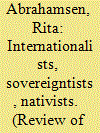

|
|
|
|
|
| Summary/Abstract |
Contrary to common assumptions that the liberal world order was ‘made in the West’, this article argues that it was produced in interaction with Pan-African ideology and actors. Developing a morphological analysis, it identifies three contending visions of world order within Pan-Africanism: a world of continental unity and transnational solidarity; a world of national sovereignty; and a world of racially defined units. It concludes that Pan-Africanism contains intellectual and political resources for the defence, reinvigoration, and invention of a more just, equal and rule-bound multilateral world, but that this cannot be taken for granted. Pan-Africanism is neither inherently progressive, nor reactionary, and can support multilateralism and sovereigntism in equal measure. Pan-Africanism's nativism also carries particular risks at a time when similar identitarian viewpoints are promoted by Radical Right movements. Understanding the manner in which Pan-Africanism informs and legitimises diverse political agendas is thus of crucial importance for IR, for Pan-Africanists, and for the future of world order.
|
|
|
|
|
|
|
|
|
|
|
|
|
|
|
|
| 5 |
ID:
170724
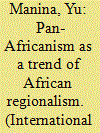

|
|
|
|
|
|
|
|